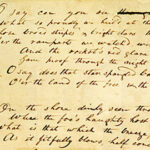

There were many over the decades who risked their lives to free themselves. On May 8, 1937, formerly enslaved Adeline Willis of Georgia bragged to an interviewer from the Federal Writers’ Project about the hickory-striped dress she wore that had brass buttons on the wrists: “I was so proud of that dress and felt so dressed up in it I just strutted er round with it.” The enslaved sought some measure of liberty everywhere they could, even in modes as intimate and personal as their choice of clothes. Some mothers, like Esther, used the law to secure their children’s freedom. When their water broke, some pregnant women fled to caves to give birth, to allow their newborns to enter the world in freedom. They navigated life and faced death with liberty in their hearts. They stole fragments of liberty and created spaces of freedom within the institution of slavery, even before they were ever legally “free.” They put down their rakes and hoes and rested on beds of hay they stole afternoon naps while hanging tobacco they held nighttime parties to dance away their pain, and they held prayer meetings in the woods to nourish their spirits with hope. They did not wait idly for proclamations and decrees.

It must be about what had already been claimed.Į nslaved people were always the first givers of their own liberty. What we acknowledge this Juneteenth must be about more than what was given. But the truth is that Juneteenth is a celebration of just one way that Black people either created freedom or found it, often on their own terms. Now Juneteenth-the holiday commemorating the day enslaved people in Galveston, Texas, were informed of the end of the Civil War and the beginning of their tentative freedom-has become a symbol for this granting of freedom to Black people by the United States. They continually rejected their legal status and fought for life, liberty, and the pursuit of happiness.īut today, when Americans think about freedom, we often focus on the moments when it was granted or guaranteed by the government: moments such as the issuing of the Emancipation Proclamation in 1863 and the passage of the Thirteenth Amendment in 1865. They led strikes and revolts in the fields, defied the enslavers in song and worship, and escaped to build their own settlements. In fact, over multiple centuries, in every period of history, enslaved people received, took, filed, fled, reclaimed, and sued for their freedom. They granted Esther’s petition, and she and her two children were immediately set free.Įsther’s story sounds remarkable, but in the larger story of slavery in the Americas, it was not an anomaly. He instructed the members of the jury to read the letter of the law.

But there in the courtroom, he was committed to Esther’s defense. Her representation was a Maryland lawyer with a famous name and a fraught history: Francis Scott Key, the man who wrote “The Star-Spangled Banner.” Key owned people himself, and was a prominent proponent of sending emancipated Black people back to Africa. But Esther knew the law, and kept track of each of the 365 days that needed to pass before her bondage would be invalidated. It was a technicality, part of a law designed to stop the importation of enslaved people into the capital. In 1827, Buckner had intended to move the family to his new home in the District of Columbia, but had neglected to heed a local law requiring him to relocate them within a year of establishing residency. Buckner, on behalf of herself and her two children in federal court. The enslaved woman filed a suit against her enslaver, Bernard H. T wo centuries ago, a woman named Esther claimed her freedom.


 0 kommentar(er)
0 kommentar(er)
